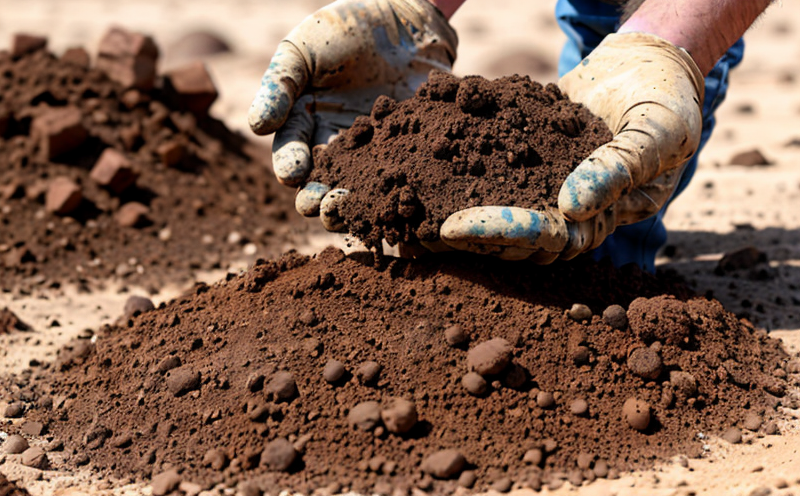ASTM D3080 Direct Shear Strength of Soil Testing
The ASTM D3080 standard provides a method to determine the direct shear strength of soil using a specifically designed apparatus. This service is crucial for mining operations, especially in sectors dealing with soil and overburden characterization, as it offers insights into the engineering properties of soils under direct shear conditions.
Direct shear testing measures the frictional resistance between two parallel planes of soil when one plane is moved relative to the other at a constant velocity. The test is conducted by applying a normal load to the sample and then shearing it until failure occurs, after which the peak shear strength can be calculated. This method is particularly useful for determining the stability of slopes in mining environments where overburden must be managed safely.
The ASTM D3080 apparatus consists of two vertical walls with a horizontal top plate that can move downward to apply normal stress and shear forces to the soil sample. The key components include:
- A rigid frame for securing the sample
- Two parallel plates, one stationary and one movable
- Shear force sensors to measure applied load
- A displacement mechanism for controlled shearing
The test method is governed by ISO standards as well, ensuring that results are consistent with international norms. The direct shear test provides a quick assessment of the soil's internal friction angle and cohesion under conditions similar to those encountered in mining operations.
For accurate testing, the specimen preparation involves:
- Selecting representative samples from the field or laboratory
- Conditioning the sample according to ASTM D3080 guidelines
- Cutting the sample into a cylindrical shape with standardized dimensions
- Mounting the sample between the shear box plates
The testing process is as follows:
- Applying normal load to the sample using hydraulic or mechanical means
- Shearing the specimen at a constant rate until failure occurs
- Recording the peak shear stress and displacement data
- Calculating the friction angle and cohesion based on the test results
The direct shear strength test is essential for predicting the stability of slopes, retaining walls, and other structures in mining environments. It helps ensure that engineered solutions meet safety standards while minimizing environmental impacts.
Understanding the direct shear behavior of soils under various conditions can prevent catastrophic failures such as landslides or slope collapses. By using ASTM D3080 testing, mining companies can enhance their operational safety and compliance with regulatory requirements.
Scope and Methodology
The scope of the ASTM D3080 direct shear strength test covers a wide range of applications in the mining sector. The primary objective is to provide accurate data on the frictional resistance of soil under controlled conditions, which is vital for designing safe and efficient excavation plans.
The methodology involves:
- Preparation of representative soil samples
- Conditioning the samples according to ASTM D3080 specifications
- Cutting the samples into cylindrical specimens with standard dimensions
- Mounting the specimens in a shear box
- Applying normal load and shearing until failure occurs
- Recording peak shear stress, displacement, and other relevant parameters
- Calculating friction angle and cohesion based on test results
The testing process is conducted with precision to ensure that the results are reliable and reproducible. The apparatus used in this method includes:
- A rigid frame for securing the sample
- Two parallel plates, one stationary and one movable
- Shear force sensors to measure applied load
- A displacement mechanism for controlled shearing
The test is designed to simulate real-world conditions as closely as possible. This ensures that the results are applicable to actual mining operations.
The ASTM D3080 standard provides detailed guidelines on specimen preparation, testing procedures, and data analysis. Compliance with these standards ensures consistent and accurate results across different laboratories.
Quality and Reliability Assurance
The ASTM D3080 direct shear strength test is highly reliable due to its strict adherence to international standards and rigorous quality control measures. By following the guidelines outlined in ASTM D3080, laboratories can ensure consistent and accurate results.
- Representative sample selection: Ensures that the soil tested accurately reflects field conditions
- Conditioning according to specifications: Prevents errors due to improperly conditioned samples
- Standardized specimen dimensions: Minimizes variability in test results
- Calibrated equipment: Ensures accurate measurement of load and displacement
The reliability of the ASTM D3080 testing method is further enhanced by regular calibration and validation against known standards. This ensures that all laboratories providing this service meet high-quality standards.
Competitive Advantage and Market Impact
- Increased safety: By accurately assessing soil strength, mining companies can design safer operations and reduce the risk of slope failures
- Better compliance: Reliable test results ensure adherence to regulatory requirements, reducing the likelihood of fines or legal action
- Enhanced reputation: Providing accurate and reliable testing services can enhance a laboratory's reputation in the market
- Potential for innovation: Understanding soil behavior better allows mining companies to develop more efficient processes and technologies
The use of ASTM D3080 testing provides a competitive advantage by ensuring that mining operations are safe, compliant, and innovative. This service is crucial for maintaining the market's high standards in the mining sector.





